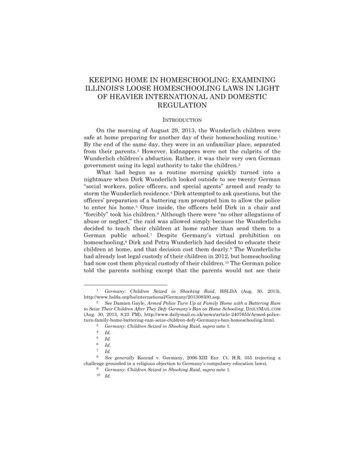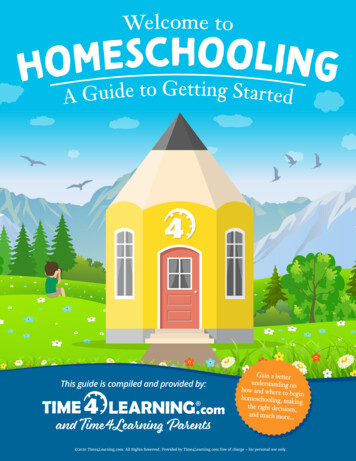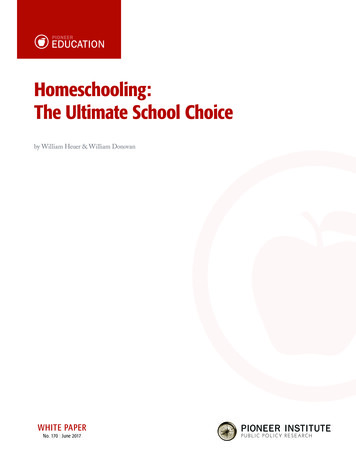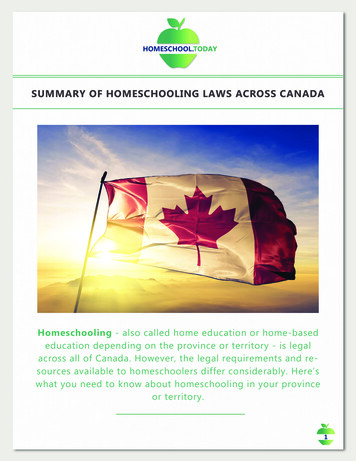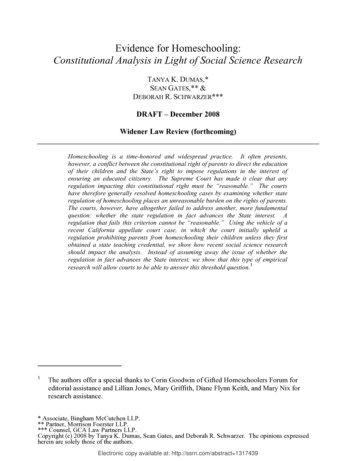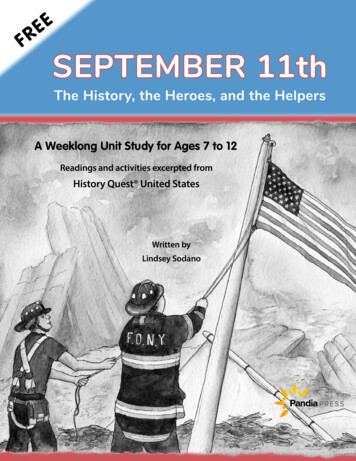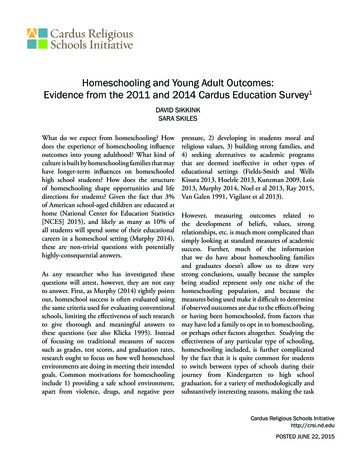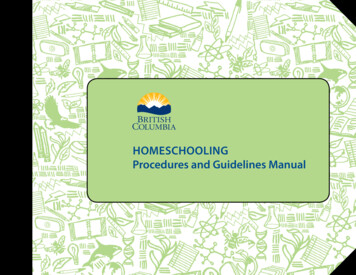
Transcription
HomeschoolingProcedures and Guidelines ManualThe Ministry of Education Homeschooling Procedures and Guidelines Manual 1Consultation Draft
The Ministry of Education Homeschooling Procedures and Guidelines Manual 2Consultation Draft
table of contentsSECTION I: OVERVIEWAbout This Document 4SECTION II: LEGISLATIVE PROVISIONS ANDBETTER PRACTICE GUIDELINES51. Registration Process 12What Is Homeschooling? 52. Educational Program 21Homeschooling Educational Program: 63. Educational Services 26Registered Homeschoolers & Students; Homeschooling &Online Learning: 64. Health and Well-Being 33Who Should Use These Guidelines?The Role of the Ministry of Education:Table 1: Differences between Homeschooling, OnlineLearning and learning in a Standard SchoolTable 2: Educational Program: Roles and ResponsibilitiesConsiderations When Exploring HomeschoolingChildren / Youth with Disabilities and /or Diverse Abilities:75. Duty to Report Concerns that a Child may be inNeed of Protection35Section III: GLOSSARY 367Emergency Numbers 398appendix one: Summary by Key User Groups4088When Does A Homeschooler Cease To Be A Homeschooler? 9Homeschooling & Graduation: Earning Credit for GraduationThrough Online Learning 10Considerations: Taking “for credit” Online Learning courses(Grades 10-12) while remaining registeredas a homeschooler: 10Considerations: entering or re-entering theBC education system: 10B.C. Secondary School Transcript of Grades orGraduation Certificate: 10Homeschooling And Post-Secondary Education11Homeschooling And Covid-1911The Ministry of Education Homeschooling Procedures and Guidelines Manual 3Consultation Draft
SECTION I: OVERVIEWAbout This DocumentThe Homeschooling Procedures and Guidelines Manual providesan overview of the Homeschooling framework in British Columbiaand a summary of requirements and better practices to supportRegistered Homeschoolers.This version of the document is a consultation draft intended tobe posted to the Ministry of Education website for broader review.Please send feedback by April 2, 2021 to s will be considered in advance of publication of the finalHomeschooling Procedures and Guidelines Manual, anticipatedprior to the end of the 2020/21 School Year.The right to choose Homeschooling is afforded to parents and legalguardians in British Columbia through legislation.The manual is divided into three sections:1 OverviewSection 1 provides an overview of the Homeschoolingframework in British Columbia (B.C.) and is intended for a broadaudience.2 Requirements and Better PracticesSection 2 maps Homeschooling requirements and betterpractices to support Registered Homeschoolers. Better practicesare not legal requirements. Better practice considerations aretherefore optional and are provided with the intent to assistwith helping each stakeholder group to consider topics thatmay or may not be relevant to their circumstance. Information ispresented as five topics.Topic 1: RegistrationTopic 2: Educational ProgramsTopic 3: Educational ServicesTopic 4: Health and Well-beingTopic 5: Child Protection ConcernsInformation is organized according to the different stakeholdergroups that play a role in Homeschooling. This presentation isintended to clarify the roles and responsibilities of each stakeholdergroup, and to outline differences between Public and IndependentSchool responsibilities. Appendix One, at the end of this document,presents requirements and better practices in a table that isorganized by key stakeholders (as a primary organizer).The following groups are considered to behomeschool stakeholders:Home EducatorsRegistered HomeschoolersRegistering Public SchoolsRegistering Independent SchoolsBoards of EducationIndependent School AuthoritiesSuperintendents / Dir. Général of the Francophone EducationAuthorityField StaffCommunity Partners3 GlossaryThis Section presents definitions of key terms, which arecapitalized throughout the document.The Ministry of Education Homeschooling Procedures and Guidelines Manual 4Consultation Draft
This document was collaboratively developed between the spring of 2020 and early 2021 by a working group comprised of educationsector and provincial government representatives. The Ministry of Education wishes to extend sincere thanks to the following groups forcollaborating on the development of these guidelines: B.C. Council for Administrators of Inclusive Supports in Education, the B.C. HomeEducators’ Association, the B.C. School Superintendents’ Association, the B.C. Principals’ & Vice-Principals’ Association, the Federation ofIndependent SchoolAssociations, the First Nations Education Steering Committee, the First Nations Schools Association and the Ministry ofChildren and Family Development.It is the Ministry of Education’s intention to update this manual to reflect future legislative or policy changes as required.Who Should Use These Guidelines?This document is intended to be used by current or prospectiveHome Educators, Registered Homeschoolers, and the people whosupport them, including: Registering Schools; Boards of Educationand Independent School Authorities; Superintendents, FieldStaff (e.g. social workers, child and youth workers) andCommunity Partners.delivers the Educational Program to the homeschooled child /youth at home or elsewhere. The Home Educator often incorporatescommunity resources into the Homeschooling EducationalProgram. Homeschooling may take various forms and may or maynot resemble the Educational Program that would otherwise havebeen provided to a Student by a Public or Independent School.The intent behind including Registered Homeschoolers as oneof the key groups in this document is to be child-centered andaccessible to children and youth. This approach aligns with currentresearch in educational best practice and with British Columbia’sredesigned curriculum, which emphasizes the personalizationof Student learning to address the diverse needs and interests ofchildren and youth and the engagement of children and youth – inage-appropriate ways – in the development of their EducationalPrograms and in the assessment of learning.The right or entitlement of a parent or guardian to homeschool theirchildren is recognized within the Ministry of Education’s legislativeand policy framework (School Act and the Independent School Act,Ministry Homeschooling Policy, Ministry Distributed Learning Policy for Homeschoolers and this document, the HomeschoolingProcedures and Guidelines Manual). Home Educators have theoption of accepting the offer of Educational Services from theRegistering School or independently selecting and providingEducational Services for their homeschooled child.This document is not intended to discourage parents or legalguardians contemplating Homeschooling or to create theimpression that Homeschooling presents any inherent danger tochildren and youth. The document is also not intended to beused as a tool to assess a specific Home Educator or theirEducational Program.Homeschoolers represent a relatively small proportion of theschool-aged population in B.C. The percentage of homeschoolRegistrations across the education system remained fairly static(below 0.4%) for nearly two decades. Likely in response to theCOVID-19 pandemic, the number of homeschool Registrationssuddenly increased across the province and for the 2020/21School Year, homeschoolers represented 0.8% of the school-agedpopulation (based on a September 30, 2020 snapshot). MostRegistered Homeschoolers are in the elementary and middle schoolage range, as the majority of Registered Homeschoolers transitionto B.C.’s education system by the time they are eligible to enroll inGrades 10, 11 and 12.What is Homeschooling?Homeschooling is an alternative method of teaching and learningoutside of the B.C. K-12 education system. The HomeschoolingEducational Program (planning, delivery and assessment) is theresponsibility of the Home Educator. Typically, a family memberThe Ministry of Education Homeschooling Procedures and Guidelines Manual 5Consultation Draft
Homeschooling educational program:The School Act defines an “Educational Program” as a set of learningactivities that is designed to enable learners (enrolled Studentsand homeschooled children) to become literate, to developtheir individual potential and to acquire the knowledge, skillsand attitudes needed to contribute to a healthy, democratic andpluralistic society and a prosperous and sustainable economy.Within the context of Homeschooling, the parent has the authorityto determine how the Homeschooling Educational Program meetsthe requirements of this definition.Registered Homeschoolers & Students; Homeschooling &Online Learning:There can be confusion around the distinction between aRegistered Homeschooler and a Student who is enrolled with anOnline Learning School. The key difference between a RegisteredHomeschooler and an enrolled Student is who delivers andoversees the Educational Program. In the case of a RegisteredHomeschooler, the Home Educator is entirely responsible for theEducational Program. For Students enrolled with a Public School(standard or online), or with a Group 1,2 or 4 Independent School(standard or online), a B.C. Certified Teacher, employed by a Boardof Education or an Independent School Authority, is responsible forplanning, delivering and assessing the Educational Program as partof their duties of employment.Often families with a child enrolled in an Online LearningSchool, who primarily learns in the home, view themselves to behomeschoolers. However, aligning with the legislative definitions,the Ministry only recognizes Registered Homeschoolers ashomeschoolers. However, a Registered Homeschooler may retaintheir homeschooler status while enrolling in Online Learningcourses made available by a Board of Education or IndependentSchool Authority at the Grade 10-12 level. This exception wasestablished to enable Registered Homeschoolers to earn creditsthat could be applied towards graduation from the B.C. educationsystem, and/or to facilitate a pathway to application or entry topost-secondary education (e.g. to complete pre-requisite courses). Ifthe homeschooled child / youth does not enroll in Online Learningcourses at the grade 10-12 level, they will not meet the graduationrequirements to earn a B.C. certificate of graduation.Another important difference between Homeschooling and OnlineLearning is the level of Ministry of Education funding providedto Boards of Education / Independent School Authorities forStudents versus Registered Homeschoolers. Boards of Educationand Independent School Authorities receive a larger amount offunding from the Ministry of Education for providing an EducationalProgram to Students. The Ministry provides a minimal grant to coverthe administrative costs associated with the Registration processand the requirement to offer Educational Services for RegisteredHomeschoolers. In both cases, funding is not delivered to parents/guardians, but rather to the Board or Authority.A Registered Homeschooler is a child / youth that hasbeen registered as a homeschooler, as per section 13 ofthe School Act. A Home Educator is a parent/guardian of aRegistered Homeschooler, who is responsible for providingthe homeschooled child with an Educational Program, as persection 12 of the School Act.In brief, Homeschooling is not: supervised by a B.C.-certified Teacher, as part of theirduties of employment with a B.C. school required to follow the provincial curriculum inspected by the Ministry of EducationThe Ministry of Education Homeschooling Procedures and Guidelines Manual 6Consultation Draft
The Role of the Ministry of Education:The Ministry of Education is responsible for setting policy and forproviding funding to Boards of Education and Independent SchoolAuthorities. Provincial Homeschooling grants are provided onan annual basis to Boards of Education and Independent SchoolAuthorities for each Registered Homeschooler that is reportedto the Ministry of Education in the Fall. Homeschooling grantsare intended to cover administrative costs associated with theRegistration process and the requirement for Registering Schoolsto offer Educational Services. No provincial funding is sent directlyfrom the Ministry of Education to Home Educators or RegisteredHomeschoolers. Boards of Education receive 250 for each homeschoolerregistered with a Public School within the district. Independent School Authorities holding a certificate of group1 or group 2 classification receive 175 for each RegisteredHomeschooler. Note that Independent School Authorities alsohave the ability to set a fee for homeschool Registration.Table 1 Differences between Homeschooling, Online Learning and Learning in a Standard SchoolCriteriaMust follow the B.C. CurriculumLearning must be supervised by a B.C.-certifiedTeacher, as part of their duties of employment with aB.C. school (responsibilities include planning,selecting Educational Resource Materials, facilitatinglearning activities and documenting learning).Student progress must be evaluated, and report cardsprepared by a B.C.-certified Teacher.Student must participate in Provincial GraduationAssessments and Foundation Skills AssessmentsReligious texts / resources may be used“Status” in a schoolHomeschool NONOonline school NO NO Although optional forGrades 10-12RegisteredHomeschooler*NOstandard school NOin Public Schoolsin Public Schoolsin Independent Schoolsin Independent SchoolsStudentStudent * Registered Homeschoolers who are eligible to enroll in Grades 10-12 courses may remain a homeschoolerwhile also enrolling in Online Learning courses at the Grade 10 to 12 level.The Ministry of Education Homeschooling Procedures and Guidelines Manual 7Consultation Draft
Table 2 Educational Program: Roles and ResponsibilitiesResponsibilitiesHomeschoolonline schoolstandard schoolHome Educator(at the discretion of theHome Educator)Board of Education/Independent SchoolAuthority*Board of Education/Independent SchoolAuthority*Home Educator(at the discretion of theHome Educator)**B.C.- Certified Teacher/Board of Education/Independent SchoolAuthority / Ministry ofEducationB.C.- Certified Teacher/Board of Education/Independent SchoolAuthority / Ministry ofEducationResponsibility for Developing the Learning Plan(and Individual Education Plan, if required).Home Educator(at the discretion of theHome Educator)B.C.- Certified TeacherB.C.- Certified TeacherResponsibility for Selecting ResourcesHome Educator(at the discretion of theHome Educator)**B.C.- Certified Teacher/Board of Education/Independent SchoolAuthorityB.C.- Certified Teacher/Board of Education/Independent SchoolAuthorityB.C.- Certified Teacher/Board of Education/Independent SchoolAuthorityB.C.- Certified Teacher/Board of Education/Independent SchoolAuthorityB.C.- Certified TeacherB.C.- Certified TeacherResponsibility for Extended Assessments,(facilitating and covering the cost)Responsibility for Evaluation and AssessmentResponsibility for Facilitating an Organized Set ofLearning ActivitiesResponsibility for Documenting LearningHome Educator(required)Home Educator(at the discretion of theHome Educator)*Parents/guardians of Students at an Independent School may be expected to pay for Extended Assessments.** Registering Schools have some responsibilities with regard to offering access to educational services (loanof educational resource materials and evaluation and assessment services).The Ministry of Education Homeschooling Procedures and Guidelines Manual 8Consultation Draft
Considerations When Exploring HomeschoolingHomeschooling comes with great responsibility. Choosing thisoption means the Home Educator must provide and supervise allaspects of their child’s Educational Program, including curriculumand Learning Materials. For families with the time, resourcesand interest, Homeschooling can be an extremely rewardingeducational option. However, some families who are interested inHomeschooling may not find it possible or practical.Sometimes a family will become interested in Homeschooling asa result of a situation where they feel that a child’s needs have notbeen met in a particular school environment. Families may wish toexplore the full spectrum of educational options that are availablebefore choosing to homeschool their child. School Districts andIndependent Schools can offer a range of settings and experiencesfor Students, ranging from standard to alternate and highlyspecialized in-person and online programs.A range of factors should be considered when deciding whetherHomeschooling is a good fit and will support the child / youth’seducation and development. These include the reasons for andcommitment to Homeschooling the child / youth, as well asthe Home Educator’s ability to provide a healthy and supportiveenvironment necessary for learning. Additional factors for the HomeEducator’s consideration include: m eeting and responding to any Disabilities and /or DiverseAbilities the child / youth may have; providing social opportunities; providing access to community supports / networks; providing access to recreation, sports and wellness facilities; s upporting the child / youth’s longer term and life goals (e.g.support for post-secondary transitions); and b alancing the Home Educator’s career and / orother commitments.To help decide whether Homeschooling is the best option,Homeschooling advocacy groups can provide more information onHomeschooling, and its advantages and challenges.Children / Youth with Disabilities and /or Diverse Abilities:Children with Disabilities and Diverse Abilities may require arange of educational supports and services. When such Studentsare enrolled with a Public or Independent School, they maybe entitled to additional supports provided by the Board ofEducation or Independent School Authority. Boards of Educationand Independent School Authorities receive supplementalinclusive education funding from the Ministry of Education foreligible enrolled Students to support their needs. In the caseof a homeschooled child / youth, it is the parent /caregiver’sresponsibility to provide the homeschooled child /youth with anappropriate and supportive Educational Program. The Ministryof Education does not provide inclusive education funding toRegistering Schools or to Home Educators. Homeschooled children/ youth with Disabilities and Diverse Abilities are not eligible toreceive inclusive education supports through the RegisteringSchool or assistance in developing their Educational Program.Note: Online Learning schools may set their own policies withregard to enrolling Students with a Special Needs / InclusiveEducation diagnosis, but these Students are funded at the samerate as Students in Standard Schools.When Does A Homeschooler Cease To Be AHomeschooler?A Registered Homeschooler who enrolls in an Educational Programoffered by a Board of Education or Independent School Authoritydoes not retain their Registered Homeschooler status. The onlyexception to this is when an eligible Registered Homeschoolerenrolls in an Online Learning School for Grades 10-12.A Registered Homeschooler may audit a course (not for credit) withthe permission of a Board or Authority and remain registered as ahomeschooler. Credits towards graduation cannot be earned forcourses taken in this way.The Ministry of Education Homeschooling Procedures and Guidelines Manual 9Consultation Draft
Homeschooling & Graduation: Earning Credit ForGraduation Through Online LearningConsiderations: entering or re-entering the BC educationsystem:A Registered Homeschoolers may not obtain a B.C. Certificate ofGraduation (Dogwood Diploma) through Homeschooling alone.In most cases, when a Registered Homeschooler is ready to enterin the B.C. graduation program, they choose to enroll and willtransition to ‘enrolled status’. In so doing, they may obtain a B.C.Certificate of Graduation or Adult Graduation Diploma and / ortake pre-requisite courses for a post-secondary program. Pleasesee the Ministry of Education’s Graduation Program Handbook ofProcedures for information regarding the paths to graduation andcorresponding requirements.Most homeschoolers are in the elementary school age range.Almost all homeschoolers either return to or enter the B.C.education system at some point in time. To return or enter the B.C.education system, contact a Board of Education or IndependentSchool. Staff can assist and place the child / youth in an appropriateEducational Program.As previously noted, Registered Homeschoolers may not retain theirstatus if they enroll in an Online Learning School, except for when aRegistered Homeschooler enrolls in an Online Learning School forGrades 10-12. Credit earned in Grades 10 to 12 for Online Learningcourses can be counted towards graduation requirements.Considerations: Taking “for credit” Online Learning courses(Grades 10-12) while remaining registered as a homeschooler: Homeschoolers contemplating enrolling in a high schoolcourse via Online Learning should discuss course readiness andany relevant prior learning with the staff at the Online LearningSchool. Homeschoolers contemplating enrolling in a school to pursuea path to graduation should discuss course readiness and anyrelevant prior learning with the staff at the school. The Earning Credit through Equivalency, Challenge, ExternalCredentials, Post Secondary Credit and IndependentDirected Studies policy provides information on some of thenon-traditional ways that fully enrolled Students can earncredit towards graduation in B.C. This policy may be helpfulfor Registered Homeschoolers who may be consideringtransitioning to regular, enrolled Student status.B.C. Secondary School Transcript of Grades or GraduationCertificate:To order an official B.C. Secondary School Transcript of Gradesor Graduation Certificate (Dogwood), please visit the Ministry ofEducation’s Student Transcripts Service (STS) website athttp://www.studenttranscripts.gov.bc.ca. The Registering School is the school of record. As the school ofrecord, the Registering School will be responsible for reportingfinal grades to the Ministry of Education and ensuring that thecourses appear on the Registered Homeschooler’s Ministry ofEducation transcript. If the Online Learning School is not theRegistering School, Homeschooling families should ensurethat the Online Learning School knows where the Student isregistered at the time of course enrollment.The Ministry of Education Homeschooling Procedures and Guidelines Manual 10Consultation Draft
Homeschooling And Post-Secondary EducationHomeschooling and Covid-19Registered Homeschoolers who do not earn a B.C. Certificate ofGraduation may still be eligible for admission to a post-secondaryeducation program. Registered Homeschoolers who do not intendto earn a B.C. graduation credential and wish to attend a postsecondary institution should research admission requirements forpotential programs of choice and confirm admission requirements,eligibility and procedures directly with the institutions.Be advised that the Provincial COVID-19 Health and SafetyGuidelines for K-12 Settings and the BC Centre for Disease ControlCOVID-19 Public Health Guidance for K-12 School Settings are notapplicable in a home setting. Home Educators are encouraged toadapt relevant sections of these documents to their homeschoolsetting and to take as many preventative measures as possiblewhen organizing group Homeschooling activities. Measures suchas physical distancing, mask use when physical distancing is notpossible, frequent hand hygiene, and cleaning/disinfecting are allencouraged, particularly when interacting with people outside ofyour social bubble. Home Educators are also advised to keep up todate with any Province-wide restrictions.The BC Transfer Guide may also be a helpful resource:https://www.bctransferguide.caThe Ministry of Education Homeschooling Procedures and Guidelines Manual 11Consultation Draft
SECTION II: LEGISLATIVE PROVISIONS AND BETTER PRACTICE GUIDELINES1. Registration ProcessDisclaimer: The legislation and policy provisions noted below do not comprise an exhaustive list of all relevant provisions.All entities are advised to conduct legal due diligence and to comply with all applicable legislation.The Registration process includes both the act of a parent/guardian notifying a school of their intention to homeschool a Student and theregistering school’s process for registering a Student as a homeschooler, including reporting Registrations to the Ministry of EducationNotes:1) The information presented under the legislative provisions sections below are legal requirements or entitlements. The informationpresented under better practice guidelines are optional and adherence to these Better Practice Guidelines is entirely at the discretionof the Home Educator. Please note that this document does not contain legal advice and is intended only to present some of therelevant considerations.2) The Francophone Education Authority is included under the category “Boards of Education”.The Ministry of Education Homeschooling Procedures and Guidelines Manual 12Consultation Draft
1. registration processgroupHome EducatorsLegislative Provisions: Requirements & EntitlementsBetter Practice Guidelines As per School Act, section 3 (Entry toEducational Program), children residingin BC must be enrolled in a Board orAuthority’s Educational Program, unlessregistered as a homeschooler(School Act, section 13). Understand the roles and responsibilities of Home Educators. Registration is required (if not enrolled)from the year a child turns 5 (can bedeferred until 6) until they reach the ageof 16. Homeschool Registration is optionalafter the year in which the child turns 16(School Act, section 3) and can continueup until the School Year in which they turn19 (School Act, section 1). Home Educators are required to registerhomeschooled children by September 30(annually) at the Home Educator’s schoolof choice (School Act, section 13). It is an offence not to register ahomeschooled childSchool Act, section 13(4) Aside from providing basic information tothe registering school, Home Educatorsmay choose the degree to which theywish to engage in additional elements ofthe Registration process (e.g. discussion onalternative educational settings in theB.C. K-12 school system, and onEducational Services offered by theRegistering School). Understand the difference between registeredHomeschooling, learning with an Online Learning School andlearning in a Public or Independent school. Registering Schools are required to offer EducationalServices (Educational Resource Materials and Evaluation andAssessment Services. Be informed of the Educational Services Registering Schoolscan provide in order to choose the school of registration thatbest suits each homeschooler’s needs. Be informed of any fees and / or deposits that the RegisteringSchool may require. Be informed that each Board of Education and IndependentSchool Authority has the Authority to make a determinationof whether a person is ordinarily resident in BC. This processrequires demonstrating, on the basis of objective evidence,that a person has established a regular, habitual mode oflife in BC. Families that opt to homeschool after September 30i.e. transition from enrolled to registered), should register thehomeschooled child with a Public or Independent School. Understand that the Superintendent of a School District hasan obligation to follow up on any reports received that achild who is being educated at home is not registered or maynot be receiving an Educational Program. This responsibilityextends to Registered Homeschoolers who are registered atan Independent School. Know that parents/guardians have the right to engagean advocate to be present during the Superintendent’sinvestigation.The Ministry of Education Homeschooling Procedures and Guidelines Manual 13Consultation Draft
1. registration processgroupLegislative Provisions: Requirements & EntitlementsBetter Practice GuidelinesregisteredHomeschoolers Children/youth can be homeschooledbut must be registered with a B.C. school(School Act, section 13). Registered Homeschoolers should understand thatthere is a legal requirement for Home Educators toregister a homeschooled child/youth with a Public orIndependent School.registeringpublic schools Principals of Public Schools are requiredto register the child of a parent/guardianif that parent/guardian notifies a schoolof their intent to homeschool - School Act,section 13(2). Accept homeschool registrations at any time of year. Public Schools (all delivery models) arerequired to register the child of anyparent/guardian, regardless of where theylive (in or out of catchment). Registering Schools must reporthomeschool Registrations to the Ministryof Education on the Student DataCollection Form (1701).1701 Form: Required Information1) Personal Education Number (Schools must request PEN’s for any new Students /Registered Homeschoolers prior to submitting the file to the Ministry).2) Legal names3) Birth Date4) Gender5) BC residential postal code of the homeschooled child.Enter code (HS) in the grade code field if the child’s education program is being led bythe parent or guardian and has been registered with your school.Note: Registered homeschooled child must be of school age (must be 5 years of age byDecember 31, but not 19 years of age or older as of July 1, of the current School Year ).Student Data Collections Ministry webpage has more information about the 1701data collections. To ensure consistency of practice, establish a Homeschoolingpolicy that is consistent with the legislation and addresses:the Registration process (before and after September 30),Ed
Please send feedback by April 2, 2021 to EDUC.Homeschooling. Guidelines@gov.bc.ca. Suggestions will be considered in advance of publication of the final Homeschooling Procedures and Guidelines Manual, anticipated prior to the end of the 2020/21 School Year. The right to choose Homeschooling is afforded to parents and legal
